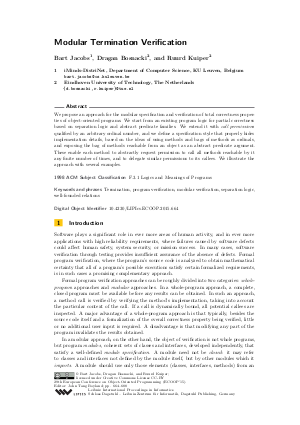Modular Termination Verification
Authors Bart Jacobs, Dragan Bosnacki, Ruurd Kuiper
-
Part of:
Volume:
29th European Conference on Object-Oriented Programming (ECOOP 2015)
Part of: Series: Leibniz International Proceedings in Informatics (LIPIcs)
Part of: Conference: European Conference on Object-Oriented Programming (ECOOP) - License:
 Creative Commons Attribution 3.0 Unported license
Creative Commons Attribution 3.0 Unported license
- Publication Date: 2015-06-29
File

PDF
LIPIcs.ECOOP.2015.664.pdf
- Filesize: 0.54 MB
- 25 pages
Document Identifiers
Subject Classification
Keywords
- Termination
- program verification
- modular verification
- separation logic
- well-founded relations
Metrics
- Access Statistics
-
Total Accesses (updated on a weekly basis)
0Document
0Metadata
Abstract
We propose an approach for the modular specification and verification of total correctness properties of object-oriented programs. We start from an existing program logic for partial correctness based on separation logic and abstract predicate families. We extend it with call permissions qualified by an arbitrary ordinal number, and we define a specification style that properly hides implementation details, based on the ideas of using methods and bags of methods as ordinals, and exposing the bag of methods reachable from an object as an abstract predicate argument. These enable each method to abstractly request permission to call all methods reachable by it any finite number of times, and to delegate similar permissions to its callees. We illustrate the approach with several examples.
Cite As Get BibTex
Bart Jacobs, Dragan Bosnacki, and Ruurd Kuiper. Modular Termination Verification. In 29th European Conference on Object-Oriented Programming (ECOOP 2015). Leibniz International Proceedings in Informatics (LIPIcs), Volume 37, pp. 664-688, Schloss Dagstuhl – Leibniz-Zentrum für Informatik (2015)
https://doi.org/10.4230/LIPIcs.ECOOP.2015.664
BibTex
@InProceedings{jacobs_et_al:LIPIcs.ECOOP.2015.664,
author = {Jacobs, Bart and Bosnacki, Dragan and Kuiper, Ruurd},
title = {{Modular Termination Verification}},
booktitle = {29th European Conference on Object-Oriented Programming (ECOOP 2015)},
pages = {664--688},
series = {Leibniz International Proceedings in Informatics (LIPIcs)},
ISBN = {978-3-939897-86-6},
ISSN = {1868-8969},
year = {2015},
volume = {37},
editor = {Boyland, John Tang},
publisher = {Schloss Dagstuhl -- Leibniz-Zentrum f{\"u}r Informatik},
address = {Dagstuhl, Germany},
URL = {https://drops.dagstuhl.de/entities/document/10.4230/LIPIcs.ECOOP.2015.664},
URN = {urn:nbn:de:0030-drops-52422},
doi = {10.4230/LIPIcs.ECOOP.2015.664},
annote = {Keywords: Termination, program verification, modular verification, separation logic, well-founded relations}
}
Author Details
References
-
Ádám Darvas and Peter Müller. Reasoning about method calls in interface specifications. Journal of Object Technology, 5(5):59-85, 2006.

-
Samin S. Ishtiaq and Peter W. O'Hearn. BI as an assertion language for mutable data structures. In POPL, 2001.

-
Bart Jacobs, Dragan Bosnacki, and Ruurd Kuiper. Modular termination verification: extended version. Technical Report CW 680, Dept. Comp. Sci., KU Leuven, 2015.

-
Daan Leijen. Koka: Programming with row polymorphic effect types. In Mathematically Structured Functional Programming, 2014.

-
K. Rustan M. Leino. Dafny: An automatic program verifier for functional correctness. In LPAR, 2010.

-
K. Rustan M. Leino and Ronald Middelkoop. Proving consistency of pure methods and model fields. In FASE, 2009.

-
K. Rustan M. Leino, Peter Müller, and Jan Smans. Deadlock-free channels and locks. In ESOP, 2010.

-
Keiko Nakata and Tarmo Uustalu. Trace-based coinductive operational semantics for While. In TPHOLs, 2009.

-
Peter W. O'Hearn, John C. Reynolds, and Hongseok Yang. Local reasoning about programs that alter data structures. In CSL, 2001.

-
Matthew J. Parkinson and Gavin M. Bierman. Separation logic and abstraction. In POPL, 2005.

-
Matthew J. Parkinson and Gavin M. Bierman. Separation logic, abstraction and inheritance. In POPL, 2008.

-
Arsenii Rudich, Ádám Darvas, and Peter Müller. Checking well-formedness of pure-method specifications. In FM, 2008.

